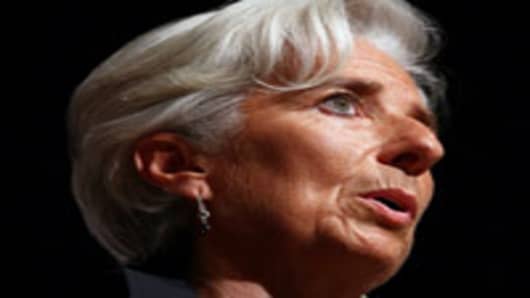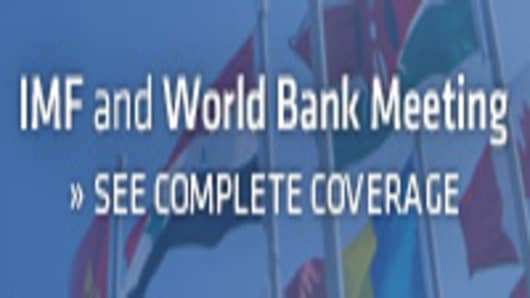The annual meeting of the International Monetary Fund and World Bank this week will feature a new leader and an old challenge—how to stem a debt crisis that threatens to spread through Europe and beyond.
Christine Lagarde's leadership of the IMFis not quite three months- old, but there's a simmering debate over whether the IMF can stage-manage the seemingly inevitable Greek debt defaultwithout turning it into a global financial crisis.
At least part of that answer may come during the organization's formal deliberations over the world's precarious financial condition Friday through Sunday in Washington, D.C.
At a news conference Thursday, Lagarde didn't address any specifics but said the financial markets, which sold off again, were ignoring "bold" efforts by EMU members to deal with the crisis, adding the process needed "collective momentum".
"There's no doubt in anybody's mind—anybody who is intellectually honest—that Greece will never be able to pay back its debt," says Sandeep Dahiya, associate professor of finance at Georgetown University's McDonough School of Business. "It's going to be one of the more significant IMF meetings."
The IMF controls the purse strings by which Greece can continue meeting its payments and avoid a full-scale default.
Lagarde caused a stir last week when she said that Greek banks will need to raise capital for the bailout funds to keep flowing. In addition, the IMF has set fairly stringent controls on Greek government spending as a bailout condition.
At the same time, the bailout program itself has drawn criticism for not simply making Greece face its debt defaultprospects and determine how much of a principal reduction its creditors will have to take.
"This crisis could have been over in three years if everybody had frankly admitted that Greece borrowed a lot more than it could serve and the people who loaned to Greece made a bad credit call," Dahiya says. "It's a very tough situation and will be interesting to see how the new IMF chief handles it."
The question of austerity measures in Greece have been hotly debated, specifically over whether forcing a country to cut back is wise at a time when growth is slow, making debt payback all the more difficult.
For her part, Lagarde has defended the IMF's hard line regarding bank capital and the responsibility of Greece to rein in its finances to avoid future debt crises.
"It's a combination of medium-term, long-term, well-anchored deliverable fiscal conditions, measures that will really require a combination of cutting public spending and broadening in a tight space. What will be the mix of both is for political leaders and parliament to decide," Lagarde said in a recent CNBC interview. "The economies (in Europe) are growing, but they're growing much more slowly than we had expected."
She insisted that the IMF is treating Greece fairly.
"Implement, you get payment for the next tranche," she said. "As I did say in the past, implementation, implementation, implementation. Time is running short and Greek authorities have to deliver."
The resistance to allowing Greece to default is curious in that sovereign debt defaults are a fairly common occurrence—and the crises that have followed have come and gone.
But in the case of Greece, there is pervasive worry over contagion—that a Greek default will trigger a similar reaction from other debt-laden nations in the euro zone, such as Portugal and Spain, leading to major hits against European banks and, ultimately, generating fallout for U.S. banks.
Resolving the situation, in fact, may no
t happen until a full-blown crisis actually does occur.
"I don't expect anything meaningful to come out of any of these meetings," says Dick Bove, vice president of equity research at Rochdale Securities. "It's going to take a crisis, and Greece is not the crisis. A major European bank (failing) would be the crisis that tips off a solution."
Bove has been vocal in his call for a European version of the Troubled Asset Relief Program (TARP), the bank liquidity fund that many have credited for staving off a full collapse of the U.S. financial system in 2008. He suggests the U.S. Federal Reserve, the European Central Bank, and Chinese authorities combine to develop the euro TARP.
"They're the appropriate group to come up with a program which would guarantee the big banks in Europe, a program which would result in investments in those banks so the banks can write off the assets that need to be written down," Bove says. "Will that happen? Ultimately it's going to happen but it isn't going to happen until a major bank fails in Europe."
This week's meeting shapes up, then, as a test for Lagarde to show a path through the debt crisis if not a firm decision.
Investors likely will be watching closely, with speculation that a Greek default could be a seismic event for financial markets.
"The first thing we're going to see in my mind is some effective direction and leadership from the new leader of the IMF," says Rob Lutts, president and chief investment officer at Cabot Money Management in Salem, Mass. "The reason people were so enthusiastic about having her get into that position is she's no-nonsense."
Indeed, the IMF has been rattling sabers heading into the meat of this week's agenda, downgrading its economic outlook for the U.S. and Europe, and telling Europe to "get its act together" regarding its finances.
Lagarde says it's important for the IMF not only to help global governments financially, but also to deliver the proper message.
"We can lend money to those countries that are going through crisis...where they need to have a third party to come in as impartially as possible," she said. "We need to continue to do that, and I think the organization itself must reflect the diversity of the world. It must look like what the world is today and how it is going to evolve over time."




